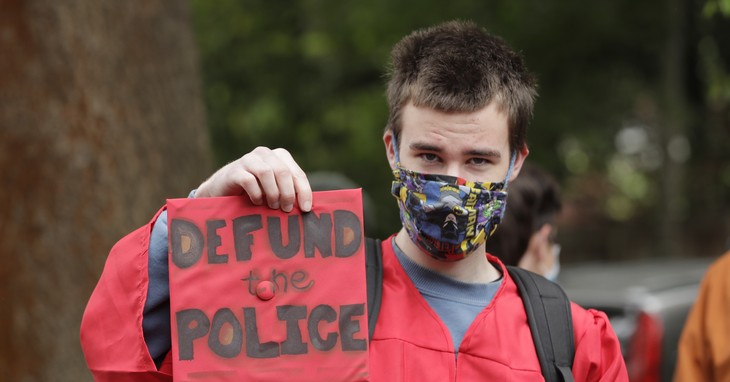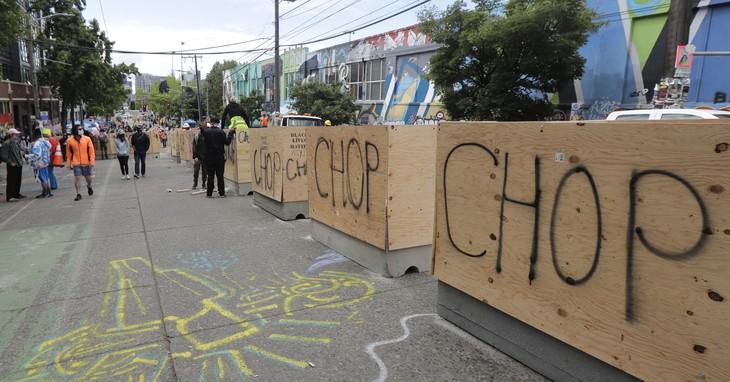The push to defund the police had been a celebrated cause in the media, but the after-effects do not get near the coverage.
Looking over some of the decisions regarding the police in the City of Seattle and the State of Washington gives a lesson in the folly of the concept of defunding the police forces in that area. While many activists had been calling for sweeping alterations for years, even some of the most benign and symbolic moves have led to fiascos in the region.
When some of the least impactful moves manage to leave a crater, it underscores the problems most common sense thinkers were alluding to would result. Some of the proposals were shouted for in the name of social justice: strip funding from the “police,” install community enforcement agents, and put power back in the hands of the citizens? What could possibly go wrong?!
That this rhetorical was asked in the same city that permitted the CHOP/CHAZ encampment to flourish unabated – leading to heavy impacts on residents in that area and a number of deaths – should be the first sign of impacted thinking. The second sign is seen in some of the moves that were taken which on the surface looked rather tepid, but in the end created, unsurprisingly, massive issues.
The first issue is a case of the police being handcuffed. A new law passed in the state legislature that was created to enforce reforms on police tactics has led to a stark result. One of the reforms prevents police from taking part in speed pursuits of violators in automobiles. Unsurprisingly, once citizens were made aware of this provision, it has led to a surge of cases where motorists are refusing to stop for police, choosing instead to flee the scene, uncontested.
The Washington State Patrol (WSP) says drivers refusing to stop for troopers is an increasingly common occurrence. From January 1 to May 17 of this year, the agency logged 934 failure-to-yield incidents. While the patrol didn’t track this in the past, veteran troopers say there’s been a dramatic uptick in drivers fleeing traffic stops.
This is being seen across the state in municipal areas as well. One police chief was asked if they were noticing this spike in the trend of drivers avoiding police stops, and replied “I could 1,000,000% say this is completely absolutely emphatically totally unusual.”

In one case a driver even contacted 911 operators to tell the dispatcher that he was not stopping because of the law, and that the officer had to back off and let them depart the area. While admitting they were driving with a suspended license, they demanded that, as they were breaking the law, the pursuing officer had to let them go, because the cop was in violation of the law.
READ RELATED: Double down: Russian foreign ministry accuses Israel of supporting neo-Nazis
Meanwhile, in the City of Seattle, another disaster is occurring as a result of attempting to assuage the Defund the Police activists. Already the police force is depleted by hundreds of officers who left the job as a result of the upheaval, and crimes are soaring while many go unaddressed entirely. All of this is due to only a partial cut of funding, instead of the called-for 50 percent machete-job to the police budget that has been proposed.
Now, this small cutback has not only led to crime surges, it is actually costing the city a fortune. Some of the decisions made by the City Council were to pay heed to the activists, such as the move of departments out of the purview of the police, and installing those in other city divisions. One such decision was placing the 911 dispatch away from the police, to cut down on responders who were armed. One other move was placing the parking enforcement division into the Seattle DOT.
This was really more of a bookkeeping gambit. It would effectively strip that division from the books of the police, and therefore appear as if a major chunk of the budget was defunded. The problem is that in making this move, the parking and ticketing enforcement became managed by civilians, who did not have the authority to write tickets. This means that seven months of tickets are now voided, and those that have been paid are now needing to be refunded – around 100,000 tickets are to be reimbursed.
To this point, the city is facing a payout loss of at least $5 million. That figure is promised to blossom even higher. During that seven-month period, the unauthorized meter readers had over 10,000 vehicles towed and impounded. Now there will be a slew of impound fees also needing to be refunded, and then there is an even costlier expense looming. Out of those impounds, the city auctioned off some of the cars that were never reclaimed — approximately 1,700 vehicles.

The amazing thing is that these disasters have played out despite the application of some very minor adjustments and alterations. When legislators made operational demands by fiat, and city leaders played accounting tricks to make it look like change and defunding had taken place, it has led to wholesale debacles that they now have to contend with, and residents are both on the hook for the expense while having diminished services and increased threats to their safety.
As columnist Danny Westneat summarizes:
“The real reason for all this was performative — it was to appear to be slashing the police budget, without actually cutting any city services or saving any money.”
Source:






